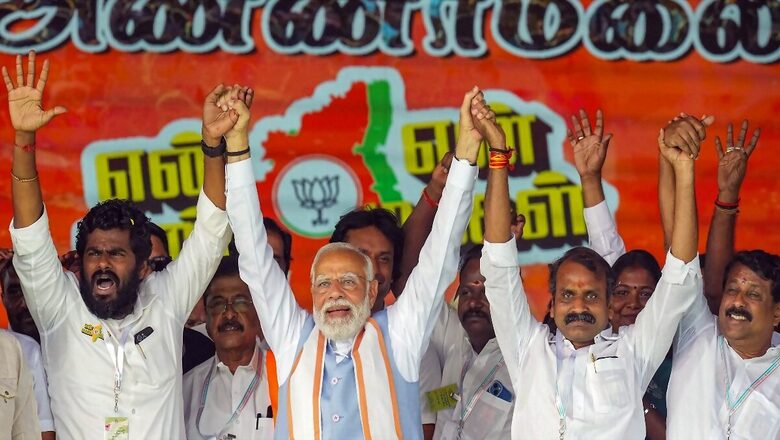
views
The DMK is back to paying obeisance at the altar of Tamil nationalism. The latest supplicant from its ranks is Andimuthu Raja who is also a Member of Parliament. Raja is in the news for questioning India’s claims to nationhood. According to Raja, India is not a nation – a composite whole with settled borders. Raja claims this is because India isn’t united or identified by one tribe of people, one tradition and one culture. Raja, in fact, gives primacy to the idea of a separate Tamil nation: one among a larger federation of subcontinental nations.
Raja’s separatism builds on efforts by his party supremo, MK Stalin to re-introduce Dravidian identity politics in the electoral theatre.
A few years ago, in the immediate aftermath of the DMK’s 2021 Assembly election victory, Stalin reset his party’s ideological compass by taking the lead through some symbolic steps. First, he began to identify himself on his social media profiles as one of “Dravidian stock” and referred to the “Mathiya Arasu” (Central government) as “Ondriya Arasu” (Union government). The idea was to emphasise that India is a federation of allegedly autonomous states.
The timing of DMK’s token reorientation came at a time when the once red-hot embers of Tamil nationalism had significantly cooled. Some commentators were a little surprised. But one observer, Rengarajan Bashyam, for instance, linked the DMK’s harking back to Tamil identity politics to the growth of ultra-parochial parties in Tamil Nadu like the ‘Naam Tamilar Katchi’ (We Tamils) party headed by Seeman.
Bashyam notes, “Brandishing a tiger flag (with uncanny similarity to the LTTE) and Prabhakaran’s portrait, he has managed to raise his vote share from a mere 1.1 per cent in 2016 to almost 7 per cent in 2021. On the record, NTK is the third largest party in TN after DMK and AIADMK, beating Congress, BJP, and PMK.”
But the NTK needs resources (money and muscle) to go into double figures if it is to pose an existential threat to the DMK in the future. These are ingredients the BJP, the latest challenger to the DMK, possesses in abundance.
The BJP has marked out Tamil Nadu as the state where it wants to capture the mind space and power. Tamil Nadu is the most electorally significant state in the South. As of today, it stands between BJP’s ambition of positioning itself as India’s truly pan-national party. All-encompassing acceptability may sound like a vanity project but it is central to the BJP’s idea of integrating Bharat around an inherently pluralistic civilisational Hinduness.
There are indications that in the Modi era and under its new state president, the earnest K Annamalai, the BJP may finally be on the brink of breaking new electoral ground in Tamil Nadu.
The BJP’s championing of Sanatana or universal Hindu Dharma and the visibly growing appeal of its message among some sections of Tamil society is breeding insecurity among DMK ranks. While the DMK’s return to its Dravidian worldview may help it thwart the BJP in the short term, it will hurt Tamils the most in the long run.
Raja has forgotten that the modern global world is built around the idea of Civic nationalism. In fact, the founding ideology of Indian nationhood — contained in India’s Constitution — is about respecting all kinds of diversities.
In sharp contrast, the DMK’s reductionist definition of nationhood is more akin to that put forth by ethno-nationalists. For example, the Nazi idea of nationhood that romanticised and exalted just one ubermensch – the mythical genetically unblemished Aryan creed.
DMK’s ethnocentric nationalism, in fact, exposes Tamils in India and beyond to the spectre of an endangering backlash. Tamils suffered discrimination in Maharashtra decades ago because they were deemed “aliens” by some parochial parties. Should Tamils who are citizens of diverse societies in Singapore, Malaysia, Sri Lanka or other nations in Southeast and West Asia be externed just because they aren’t of the same bloodline as that of the majority?
If the DMK truly cares about the Tamil people, it will need to place their long-term interests above its own short-term political goals.
Views expressed in the above piece are personal and solely that of the author. They do not necessarily reflect News18’s views.
















Comments
0 comment